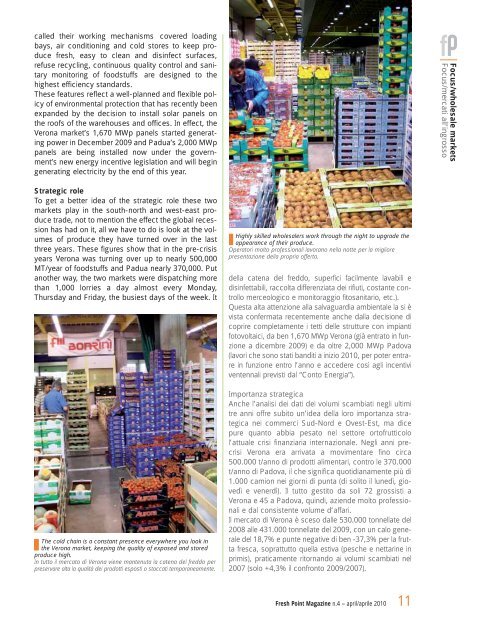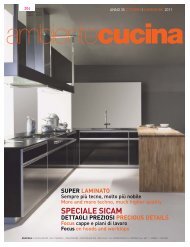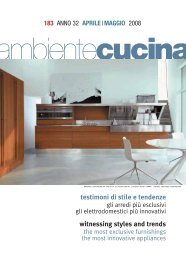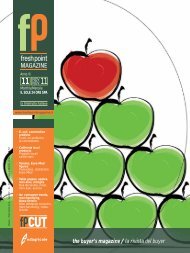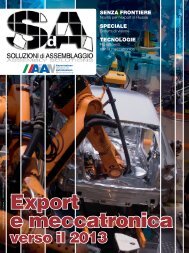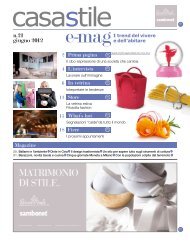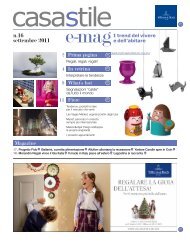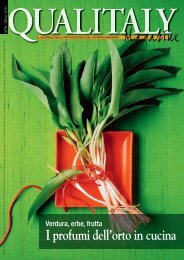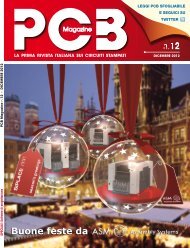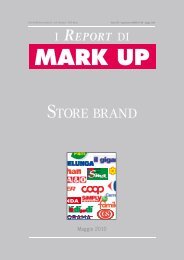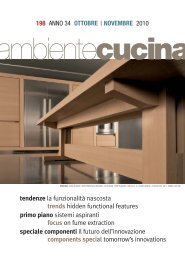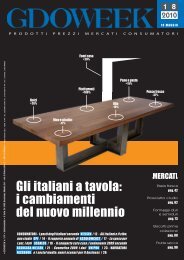Fresh Point Magazine - B2B24 - Il Sole 24 Ore
Fresh Point Magazine - B2B24 - Il Sole 24 Ore
Fresh Point Magazine - B2B24 - Il Sole 24 Ore
You also want an ePaper? Increase the reach of your titles
YUMPU automatically turns print PDFs into web optimized ePapers that Google loves.
called their working mechanisms covered loading<br />
bays, air conditioning and cold stores to keep produce<br />
fresh, easy to clean and disinfect surfaces,<br />
refuse recycling, continuous quality control and sanitary<br />
monitoring of foodstuffs are designed to the<br />
highest efficiency standards.<br />
These features reflect a well-planned and flexible policy<br />
of environmental protection that has recently been<br />
expanded by the decision to install solar panels on<br />
the roofs of the warehouses and offices. In effect, the<br />
Verona market’s 1,670 MWp panels started generating<br />
power in December 2009 and Padua’s 2,000 MWp<br />
panels are being installed now under the government’s<br />
new energy incentive legislation and will begin<br />
generating electricity by the end of this year.<br />
Strategic role<br />
To get a better idea of the strategic role these two<br />
markets play in the south-north and west-east produce<br />
trade, not to mention the effect the global recession<br />
has had on it, all we have to do is look at the volumes<br />
of produce they have turned over in the last<br />
three years. These figures show that in the pre-crisis<br />
years Verona was turning over up to nearly 500,000<br />
MT/year of foodstuffs and Padua nearly 370,000. Put<br />
another way, the two markets were dispatching more<br />
than 1,000 lorries a day almost every Monday,<br />
Thursday and Friday, the busiest days of the week. It<br />
The cold chain is a constant presence everywhere you look in<br />
the Verona market, keeping the quality of exposed and stored<br />
produce high.<br />
In tutto il mercato di Verona viene mantenuta la catena del freddo per<br />
preservare alta la qualità dei prodotti esposti o stoccati temporaneamente.<br />
Highly skilled wholesalers work through the night to upgrade the<br />
appearance of their produce.<br />
Operatori molto professionali lavorano nella notte per la migliore<br />
presentazione della propria offerta.<br />
della catena del freddo, superfici facilmente lavabili e<br />
disinfettabili, raccolta differenziata dei rifiuti, costante controllo<br />
merceologico e monitoraggio fitosanitario, etc.).<br />
Questa alta attenzione alla salvaguardia ambientale la si è<br />
vista confermata recentemente anche dalla decisione di<br />
coprire completamente i tetti delle strutture con impianti<br />
fotovoltaici, da ben 1,670 MWp Verona (già entrato in funzione<br />
a dicembre 2009) e da oltre 2,000 MWp Padova<br />
(lavori che sono stati banditi a inizio 2010, per poter entrare<br />
in funzione entro l’anno e accedere così agli incentivi<br />
ventennali previsti dal “Conto Energia”).<br />
Importanza strategica<br />
Anche l’analisi dei dati dei volumi scambiati negli ultimi<br />
tre anni offre subito un’idea della loro importanza strategica<br />
nei commerci Sud-Nord e Ovest-Est, ma dice<br />
pure quanto abbia pesato nel settore ortofrutticolo<br />
l’attuale crisi finanziaria internazionale. Negli anni precrisi<br />
Verona era arrivata a movimentare fino circa<br />
500.000 t/anno di prodotti alimentari, contro le 370.000<br />
t/anno di Padova, il che significa quotidianamente più di<br />
1.000 camion nei giorni di punta (di solito il lunedì, giovedì<br />
e venerdì). <strong>Il</strong> tutto gestito da soli 72 grossisti a<br />
Verona e 45 a Padova, quindi, aziende molto professionali<br />
e dal consistente volume d’affari.<br />
<strong>Il</strong> mercato di Verona è sceso dalle 530.000 tonnellate del<br />
2008 alle 431.000 tonnellate del 2009, con un calo generale<br />
del 18,7% e punte negative di ben -37,3% per la frutta<br />
fresca, soprattutto quella estiva (pesche e nettarine in<br />
primis), praticamente ritornando ai volumi scambiati nel<br />
2007 (solo +4,3% il confronto 2009/2007).<br />
<strong>Fresh</strong> <strong>Point</strong> <strong>Magazine</strong> n.4 – april/aprile 2010<br />
11<br />
Focus/wholesale markets<br />
Focus/mercati all'ingrosso


